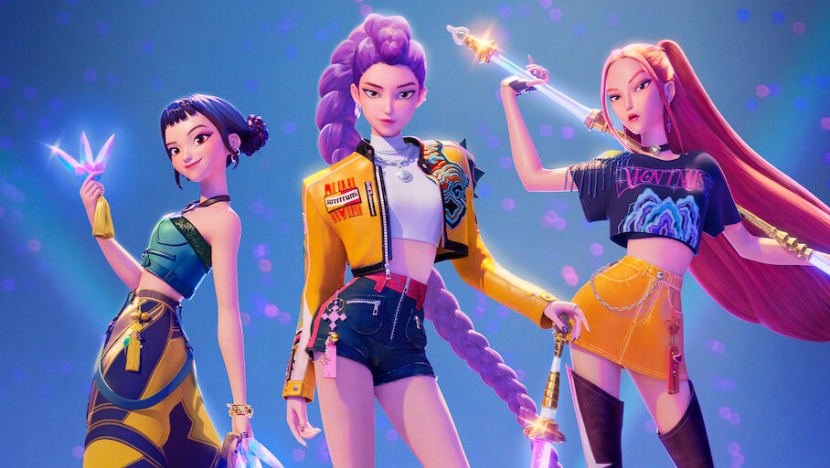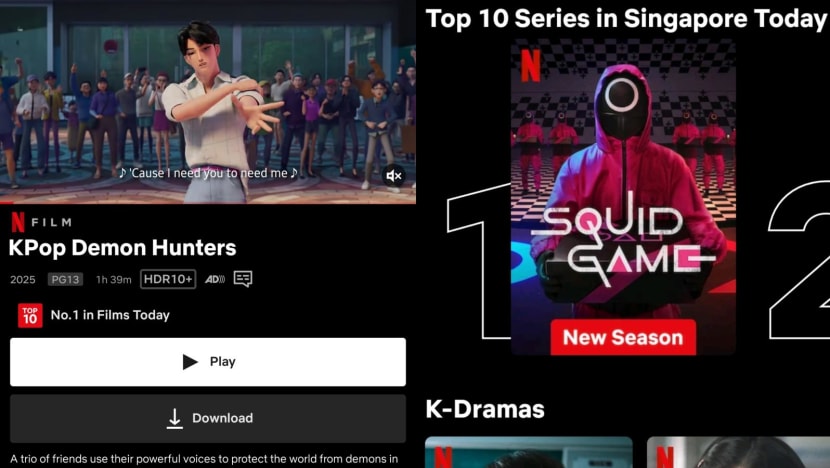Commentary: Netflix ‘KPop Demon Hunters’ success is no surprise
South Korea must ensure that not just streaming platforms profit from its unique storytelling, says Catherine Thorbecke for Bloomberg Opinion.

KPop Demon Hunters. (Image: Netflix)
TOKYO: The summer smash-hit movie that caught everyone off-guard turned out to be an animated musical about demon-fighting Korean pop stars. It’s the latest example of how South Korea’s soft power shapes global trends.
Seoul must now ensure it benefits from this unique storytelling as much as Netflix.
KPop Demon Hunters has become Netflix’s most-watched original film of all time. Its two-day theatrical run topped the US box office, and it became the first soundtrack to have four songs in the Billboard Hot 100’s top 10. The breakout popularity among children and preteens has many comparing the franchise potential to Frozen, which is estimated to have made Disney billions of dollars.
Analysts clearly see the potential. On an earnings call last week for US retailer Five Below, one asked bluntly about merchandise: “Three words: KPop Demon Hunters?”
Netflix thought it was making a movie for the K-pop and anime audience. In an increasingly interconnected world, these lines are more blurred than ever.

APPETITE FOR A MULTICULTURAL WORLD
Political rhetoric and a trade war instigated by Washington may make it seem like the age of globalism is dying. But young people continuously show an appetite for a multicultural world.
The film was set in Seoul, centres around a K-pop girl group, and takes inspiration from Korean mythology and demonology. While the dialogue is in English, it’s far from a whitewashed narrative for an American audience.
And it’s not just the Korean diaspora celebrating the film’s Asian representation.
Hollywood has no reason to be surprised anymore when seemingly “foreign” content becomes mainstream mega-hits. The Korean Wave has long been driving global pop culture trends. An International Monetary Fund report last year identified South Korea as having the highest level of “soft power.”
Netflix’s most popular non-English show of all times is Squid Game. The streaming platform said last year that more than 80 per cent of global subscribers have watched K-content on the platform.
Led by Netflix, global tech giants have accelerated, and profited from, the massive popularity of Korea’s cultural exports. Platforms like TikTok and Instagram have helped everything from K-beauty brands to Samyang Foods’s Buldak ramen – and KPop Demon Hunters dances and lip-sync videos – go viral.
These cultural exchanges are a good thing. Co-director Maggie Kang, a Korean-Canadian filmmaker, recalled in an interview how her elementary school teacher couldn’t even point to South Korea on the map.
During a screening in Seoul, Kang said her advice to aspiring local-content creators was never to try to cater to the opinions of others. “That’s the only way K-content can reach an even broader audience – show our culture exactly as it is, with confidence,” she said.
GUARDING CULTURAL FRANCHISES
South Korea must now ensure that it’s not just Western companies that profit from its coolness.
Much debate in the US has centred around whether Netflix left money on the table when it limited the theatrical release of the film, or failed to forecast the skyrocketing demand for merchandise. (Not to mention Sony Pictures Animation’s pandemic-era decision to sell the movie rights to the streaming service for what, in retrospect, was a very low-ball figure.)
But this discourse is missing a broader issue. At a time when global demand for K-content is growing, ensuring Korean companies maintain the IP rights for global franchises like Demon Hunters is an important place to start.
For platforms trying to capitalise on South Korea’s soft power, there’s a lesson: Not everything has to be culturally watered-down for an American audience. The team behind the film went to great lengths to make sure that the story maintained its authenticity in representing Korea to the world. The efforts have clearly paid off.
Netflix should be commended for recognising the international appeal of Korean storytelling and investing in it early. But it’s now time South Korea guards and profits from its cultural franchises.















